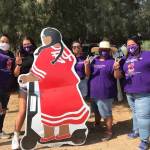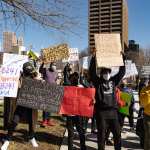At The 19th, we’re committed to publishing journalism that you can trust throughout the critical moments that shape our democracy and our lives. Show your support during our Fall Member Drive, and your donation will be matched. Double your gift today.
Native American, Indigenous and Alaska Native voters are set to play a pivotal role in key states in the presidential election and U.S. Senate contests in 2024. But they’ve consistently faced barriers to voting.
The Native American Rights Fund (NARF), an organization that provides legal representation and assistance for Native American groups and tribes, detailed these barriers as well as gaps in voting rights and access in a June 2020 report, Obstacles at Every Turn. And as states have redrawn their voting lines and passed slates of new voting restrictions in the wake of the 2020 election, NARF has gone to court to challenge both new election maps and voting restrictions — passed primarily by Republican lawmakers — for discriminating against Native voters.
Native voters aren’t monolithic in their voting behavior. But both President Joe Biden and politicians such as Democratic Sen. Mark Kelly can attribute their wins to Native voters in states like Arizona.
This year, the U.S. Supreme Court upheld a critical part of the Voting Rights Act of 1965, which banned most forms of outright discrimination and has been a critical tool for groups that have faced inequities. Shortly after, NARF helped two Native American tribes in North Dakota strike down Republican-backed legislative maps for denying them equal representation. But days later, the 8th U.S. Circuit Court of Appeals ruled that groups like NARF don’t have standing to bring such cases, a ruling likely to be challenged in the U.S. Supreme Court.
For much of U.S. history, Native Americans were denied full citizenship and rights in the United States, including the right to vote. Many now continue to face structural barriers to the ballot box, particularly on reservations. They include a lack of voting sites and ballot drop boxes, creating long distances to travel to vote, poor road conditions, inadequate infrastructure and inconsistent broadband Internet access. Many people living on reservations also lack residential addresses and don’t receive reliable mail delivery.
The 19th spoke with Jacqueline De León, a staff attorney at NARF, about representation and rights, recent court battles, and what lies ahead in 2024.
This conversation has been edited for length and clarity.
Grace Panetta: The 2020 Census found significant growth in the Native American and Alaska Native population. How are you working to translate increased population share into political representation?
Jacqueline De León: I think that Native Americans continue to grow, but they continue to be undercounted. We do think that there are even more Native Americans out there that are underserved, undercounted and that face unreasonable barriers to vote. What we’re trying to do is make sure that the structural reasons both for that undercount, and for the fact that those votes are more difficult to cast, are addressed.
Many states have passed new voting laws and restrictions since 2020. What are some trends at the state level that have been most concerning to you?
What we’re seeing, unfortunately, is an exploitation of the structural barriers in Native communities to make it more difficult to vote in response to Native Americans flexing their political power. In response to Native Americans growing in numbers, showing up and turning out to the polls, we’ve seen a backlash.
A perfect example of that is in Montana. Native Americans were credited, and have been consistently credited, with the election of [red state Democratic] Senator [Jon] Tester. And as a result, we saw laws designed to prevent Native Americans from using ballot collection to return their ballots when we know that Native communities in Montana don’t have residential mail delivery to their homes, many have poor roads, many lack vehicles, and they are dependent on people going around collecting ballots in order to return their ballots.
And so we brought that case, and then won. And then we saw the legislature pass another ballot collection ban in defiance of that state ruling, and so we had to fight that case again. We recently won again at the district court and are awaiting the Supreme Court review.
An independent U.S. Commission on Civil Rights in Montana, which is bipartisan, found that Native Americans were intentionally discriminated against when the legislature did that, when they were on notice that ballot collection was incredibly important to Native American communities and, nevertheless, passed another ballot collection ban.
This also brings to mind laws GOP lawmakers recently passed in Arizona requiring documentary proof of residency and proof of citizenship to register to vote. What are you seeing in that space?
We actually brought a case there. It was less remarked on, but they also included a proof of residential location requirement when they knew that Native Americans don’t have addresses on their homes. Nearly 40,000 homes on reservations don’t have addresses on them. Nevertheless, they put this proof of residential location requirement. And we ultimately prevailed on that case with a summary judgment finding.
Are there any other cases NARF is working on that you think are important to highlight?
This year there was the Arizona case, the Montana case, and we successfully challenged South Dakota, which was failing to provide voter registration through the [National Voter Registration Act] to Native Americans.
We’re also challenging a lack of a ballot cure provision in Alaska. Native Americans out there are credited with electing [Republican] Senator [Lisa] Murkowski and yet, ballots from rural Alaska are rejected at much higher rates than the rest of the state. And there is no opportunity to cure those ballot defects. The reasons that those ballots are rejected, again, go back to the structural reasons that many Native Americans face.
It’s been over three years since NARF released the Obstacles at Every Turn report. What are some of the biggest obstacles and barriers remaining?
Unfortunately, we just don’t have a polling place on every reservation. We don’t have early voting opportunities on every reservation. We don’t have voter registration on every reservation. Those core structural failings that we found three and a half years ago remain. We have continued to request on-reservation polling places and have had to fight for them. We haven’t gotten everything we’ve asked for, and we continue to have to push against resistance to providing those basic services.
On top of that, we’ve seen a concerted effort to roll back voting rights, which impacts Native Americans. That report was issued and then former President [Donald] Trump started his false allegations of voter fraud, which then led to a wave of voter suppression laws. Not only do we have all these structural deficits, we are now seeing those structural deficits being exploited.
Have you seen any improvements since 2020 and the release of that report?
We’ve certainly seen some bright spots. We saw New Mexico pass a Native American Voting Rights Act, Washington pass the Native American Voting Rights Act, and Colorado continues to add provisions to protect Native Americans. In fact, Colorado put an on-reservation polling place, a vote center, and saw I think, a 40 percent increase in turnout, and it was in response to the Obstacles report.
We’ve seen different states respond to these issues, and that’s been really encouraging. I’d also say that there’s been a real explosion of on-the-ground, Native-led [get out of the vote efforts]. I’m really proud and so impressed to see activists in local communities, and they’ve been working hard to combat these issues.
There’s a lot of youth-led enthusiasm demanding change, demanding participation from their election officials. That’s really impressive, and I think that is being noted. But I do think that it’s an uphill battle. It’s an uphill battle based on how difficult again, getting out the vote can be in Native communities when you’re in an extremely rural area. That requires a lot of resources.
There are many states where Native voters are poised to play a really key role in the presidential race and U.S. Senate races. How do you see the landscape for 2024?
Native Americans are going to be a crucial voting bloc in Arizona, Wisconsin, Michigan, Minnesota, Alaska, Montana and Nevada as well. Native Americans have the power to decide this presidential election. They can swing that vote. They make up big enough margins in really key, crucial swing states. And I would think that we’re going to see a concerted effort to turn out that vote and a concerted effort to keep Native Americans from being able to cast their ballots.
What do you think is most important for people to understand as we head into 2024?
Native Americans are American citizens, and we deserve the right to be able to cast our ballot with the reasonableness with which every other American casts their ballots. We shouldn’t have to make a choice between feeding our families and buying a tank of gas to get to a polling place. Instead, we should enthusiastically create opportunities for Native Americans to vote and pass laws that understand just how difficult it is.







